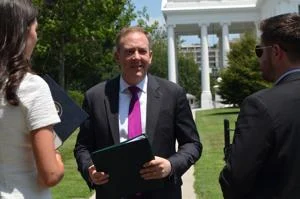Energy advocates are pleased by the Environmental Protection Agency’s proposal to repeal the Obama-era Endangerment Finding that has imposed strict regulations on the automobile industry and cost the nation $1 trillion, with one saying the move could lead to the end of EPA greenhouse gas regulations via the Clean Air Act in general.
The Competitive Enterprise Institute’s Daren Bakst told The Center Square that “Congress never envisioned or authorized the EPA to effectively tell Americans what cars they should drive or to act as the nation’s grid manager.”
Bakst is director of the Competitive Enterprise Institute’s (CEI) Center for Energy and Environment and senior fellow, CEI being a nonprofit dedicated to reforming “America’s unaccountable regulatory state.”
Bakst said that “if the EPA finalizes this rule rescinding the 2009 endangerment finding, there will certainly be litigation.”
“Assuming the rule survives legal scrutiny, then this would mean that the EPA can’t regulate greenhouse gas emissions from new motor vehicles,” Bakst told The Center Square. “There are multiple lines of argument being made in the proposed rule, so the effect of any final rule will depend on what arguments win the day.
“For example, it is possible that the Supreme Court, if it takes up the case, may decide that regardless of any endangerment analysis, the agency doesn’t have the authority to regulate these greenhouse gas emissions,” Bakst said.
“There are recent legal developments, such as the fleshing out of the major questions doctrine, which could lead to such an outcome,” Bakst said.
“Such a holding could be broad enough so that it very well could mean the agency can’t regulate greenhouse gases throughout the Clean Air Act in general,” Bakst said.
When asked if there are any other necessary changes as it concerns the EPA and motor vehicles, Bakst told The Center Square that “Congress needs to do its job” and “lawmakers need to expressly clarify that the EPA doesn’t have the authority to regulate greenhouse gases.”
“Even if it doesn’t do this, it should establish some clear limits on how far the agency can go in terms of its rules,” Bakst said.
“For example, there should be wide support for prohibiting the agency from issuing rules that kill off gas-powered cars or force the country to switch to unreliable sources of electricity,” Bakst said.
“By establishing some guardrails against the most extreme rules, the American people won’t be constantly under fear that the EPA will use its alleged power to regulate greenhouse gases as an excuse to change the very nature of our economy and society,” Bakst said.
Bakst also told The Center Square that “it is very important to recognize that the [EPA] in this rule isn’t saying that greenhouse gases in general don’t endanger public health or welfare.”
“This rule is focused on whether a narrow subset of domestic greenhouse gas emissions, in this case from new motor vehicles, cause or contribute to air pollution that may reasonably be anticipated to endanger public health or welfare,” Bakst said.
Founder and executive director of energy advocacy nonprofit Power the Future Daniel Turner said in a statement obtained by The Center Square that the EPA’s action is “a long overdue and much-needed step toward undoing Obama-era rules that gave power to unelected bureaucrats so they could make sweeping decisions about America’s energy future.”
When reached, Power the Future referred The Center Square to Turner’s statement.
“With this action, the Trump Administration is removing power from the shadows – where activist lawyers and career bureaucrats operated for years – and restoring accountability to American energy decisions,” Turner said.
Administrator Lee Zeldin “deserves great credit for this bold and decisive move,” Turner said.
When asked for comment, neither the EPA nor the Environmental Defense Fund – a climate justice group – responded.
CEI senior fellow Marlo Lewis, Jr. said in a statement obtained by The Center Square: “People who worry that repealing EPA’s ban on sales of gas- and diesel-powered cars will lead to a climate meltdown should relax,” Lewis said.
“The so-called climate crisis is a political narrative, not a scientific finding,” Lewis said. “The average person’s risk of dying today from extreme weather is more than 99 percent lower than it was a hundred years ago.”
“That great news, which the endangerment finding completely overlooked, has nothing to do with emissions or changes in the weather and everything to do with the wealth creation and technological innovation supported by humanity’s development and use of abundant, affordable energy resources,” Lewis said.
“By removing regulatory risks to innovation and investment, repeal of the endangerment finding should help foster a more climate-resilient economy,” Lewis said.






